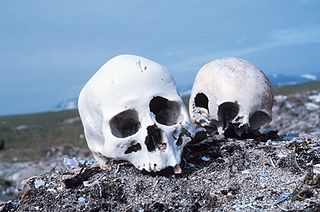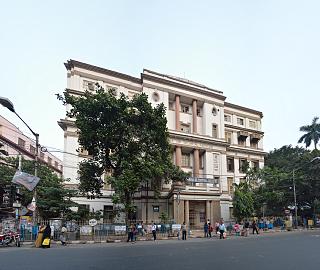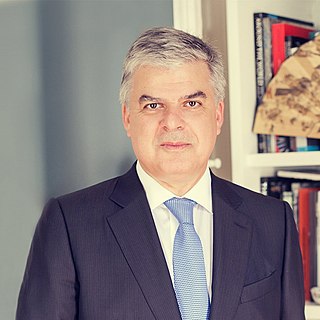
Forensic pathology is pathology that focuses on determining the cause of death by examining a corpse. A post mortem is performed by a medical examiner, usually during the investigation of criminal law cases and civil law cases in some jurisdictions. Coroners and medical examiners are also frequently asked to confirm the identity of a corpse. Also see forensic medicine.
The Grant Government Medical College, Mumbai is a medical college affiliated to the Maharashtra University of Health Sciences, Nashik. Founded in 1845, it counts among the premier medical institutions in India and one of the oldest institutions teaching Western medicine in Asia. It has been consistently ranked on the list of top ten medical colleges in the country. The college accepts 250 students annually for the undergraduate degree and around 100 annually for the various postgraduate degrees in medicine. The medical college is situated in Byculla on the campus of Sir J. J. Hospital. the hospital has combined bed strength of 2844 and caters to an annual load of 1,200,000 out-patients and 80,000 in-patients, from all parts of Maharashtra and central India.

The Huazhong University of Science and Technology is a public research university located in Guanshan Subdistrict, Hongshan District, Wuhan, Hubei province, China. As a national key university directly affiliated to the Ministry of Education of China, HUST is a Project 985 and Class A Double First Class University. HUST manages Wuhan National Laboratories for Opto-electronics (WNLO), which is one of the five national laboratories in China. HUST is also one of four Chinese universities eligible to run the national laboratory and the national major science and technology infrastructure. Huazhong University of Science and Technology was one of two Chinese universities awarded with the University Leadership Award by the Society of Manufacturing Engineers (SME), and elected as "China's Top Ten Research Institutions" by the academic journal Nature, called "The epitome of the higher education development of People's Republic of China".

Calcutta School of Tropical Medicine (CSTM) is a medical institute from Kolkata, India dedicated in the field of tropical disease. It was established in 1914 by Leonard Rogers (1868-1962) of the Indian Medical Service, professor of pathology at the Calcutta Medical College. It was, till 2003, affiliated with the University of Calcutta. Now it is under the West Bengal University of Health Sciences.
Nirmal Kumar Ganguly is an Indian microbiologist specialising in tropical diseases, cardiovascular diseases and diarrhea.

Rai Bahadur Sir Upendranath Brahmachari was an Indian scientist and a leading medical practitioner of his time. He synthesised Urea Stibamine (carbostibamide) in 1922 and determined that it was an effective substitute for the other antimony-containing compounds in the treatment of Kala-azar which is caused by a protozoon, Leishmania donovani.

Marthanda Varma Sankaran Valiathan is an Indian cardiac surgeon. He was an erstwhile President of the Indian National Science Academy and National Research Professor of the Government of India.

K. Srinath Reddy is the president of the Public Health Foundation of India and formerly headed the Department of Cardiology at All India Institute of Medical Sciences (AIIMS).
Vasant Ramji Khanolkar better known as V. R. Khanolkar was an Indian Pathologist.
Sunkara Balaparameswara Rao is an Indian neurosurgeon in Hyderabad, India. He was called the "Father of Neurosurgery" in Andhra Pradesh and has been awarded the Dr. B. C. Roy Award for organizing and developing neurosurgery in Andhra Pradesh. In 2008, he was conferred an honorary degree of Doctor of Science by the Dr. NTR University of Health Sciences. In 2015, he was awarded Lifetime Achievement award by the Telangana government.
Prof. Dr. Victor Lim Kok Eow is a Malaysian physician and microbiologist, specializing on antimicrobial resistance and infectious diseases. He is Professor of Pathology and Pro Vice-Chancellor of the International Medical University in Kuala Lumpur. He is also a member of its Board of Governors.

Ranjit Roy Chaudhury, was an Indian clinical pharmacologist, medical academic and health planner, who headed the National Committee for formulating the policy and guidelines on drugs and clinical trials in India. He was the chairman of the joint programme of World Health Organization and Government of India on Rational Use of Drugs in India. He was the founder president of the Delhi Medical Council and the president of the Delhi Society for Promotion of Rational Use of Drugs.
Khushwant Lal Wig (1904–1986) was an Indian physician, medical academic, writer and the director of the All India Institute of Medical Science, New Delhi. He was a Fellow of the Royal College of Physicians of London and a recipient of Dr. B. C. Roy Award, the highest Indian award in the medical category. The Government of India awarded him the third highest civilian honour of the Padma Bhushan, in 1964, for his contributions to the Medical science.
Prem Nath Wahi (1908–1991) was an Indian pathologist, writer, medical academic and the director general of the Indian Council of Medical Research. He was a fellow of the Royal College of Physicians of London, a founder fellow of the National Academy of Medical Sciences and a recipient of Dr. B. C. Roy Award and the Padma Bhushan.
Toppur Seethapathy Sadasivan (1913–2001) was an Indian plant pathologist, academic and the director of the Centre for Advanced Studies in Botany of the University of Madras. He was the founder of the School of Physiological Plant Pathology at Madras University and was a recipient of the Shanti Swarup Bhatnagar Prize, the highest Indian award in the science category. He was an elected fellow of the Indian Academy of Sciences, Indian National Science Academy and Indian Botanical Society and an elected member of the Academy of Sciences Leopoldina. The Government of India awarded him the third highest civilian honour of the Padma Bhushan, in 1974, for his contributions to science.
Raman Viswanathan (1899–1982) was an Indian chest physician, medical mycologist and pulmonologist, considered by many as the father of Chest Medicine in India. He was the founder director of Vallabhbhai Patel Chest Institute, a postgraduate medical institute based in Delhi. An elected fellow of the American College of Chest Physicians, Royal College of Physicians of London, Indian National Science Academy and the Academy of Medical Sciences, United Kingdom, he was a recipient of several honors including the Forlanini Medal by Italian Tuberculosis Association and the Eugeno Morelli Prize of the National Academy of Sciences, Italy. The Government of India awarded him the third highest civilian honour of the Padma Bhushan, in 1974, for his contributions to medicine.
Kewal Kishan Talwar is an Indian cardiologist, medical academic and writer, and a former chairman of the Medical Council of India. He is a former director of the Post Graduate Institute of Medical Education and Research (PGIMER) and is reported to have performed the first implantation of Implantable cardioverter-defibrillator (ICD) therapy in South Asia. He is also credited with the introduction of Cardiac Resynchronization Therapy in India. He is a recipient of several honours including B. C. Roy Award, the highest Indian award in the medical category. The Government of India awarded him the third highest civilian honour of the Padma Bhushan, in 2006, for his contributions to medicine.
Rabindra Nath Chaudhuri (1901–1981) was an Indian physician, medical academic and the director of the Calcutta School of Tropical Medicine. Born in West Bengal in 1901, he graduated in medicine from the University of Calcutta before securing his MRCP degree from the Royal College of Physicians of Edinburgh and the degree of TDD from Wales. He started his career as an assistant professor at the Calcutta School of Tropical Medicine in 1934 where he became a professor in 1945 and the director of the institution in 1950 before superannuating in 1966. He also served at Carmichael Hospital for Tropical Diseases as a Superintendent and Senior Physician.

Fausto J. Pinto is a Portuguese academic. He is Professor of Cardiology at Hospital de Santa Maria. Dean of the Faculty of Medicine at the University of Lisbon.







